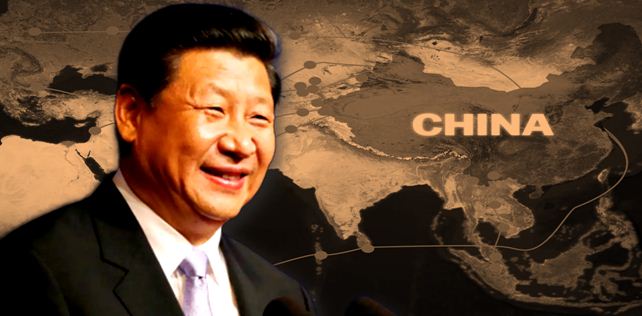A military discussion panel as part of the “two sessions” negotiations in Beijing this week focused on stronger legal protections for China’s security and rights in its territorial waters and airspace. President Xi Jinping kicked off the discussion at a meeting of deputies from the People’s Liberation Army and the People’s Armed Police Force on Monday.
The military delegates reviewed Xi’s statements at a panel meeting the next day, including ways to speed up the legislative process. Ding Laihang, a former air force commander, told the panel that legal protections for construction projects tied to the Belt and Road Initiative could be strengthened.
He also advocated stronger rights protections for China’s territorial waters and airspace “to establish a legal basis as well as a variety of methods and means for international rights protection.” Li Jun, the deputy commander of the Rocket Army, stated that legislative activity should be broadened to defend abroad interests.
Also read: What an irony: To bring down one “dictator”, the West is legitimizing three others
The Belt & Road Initiative
Early in his career in 2013, President Xi Jinping established the Belt and Road Initiative (BRI), which is a vast worldwide infrastructure program encompassing almost 140 nations and involving over $1 trillion in projects linked to energy, transportation, digital networks, and trade. The BRI is framed by Chinese officials as a “win-win” partnership centred purely on development and connectivity.
Beijing has gone to great lengths to downplay the BRI’s geostrategic implications and its ties to the People’s Liberation Army. It has tried to play the benign image for a long time. However, after consolidating power further under his hands, Xi Jinping has become overtly colonialist and has shed the image games.
And now since the Pandemic, many governments have become worried about ulterior motives behind BRI projects, many of which have dual-use commercial-military capabilities and are increasingly connected to Chinese digital technologies and satellite systems. Now, with the current happenings, it turns out that these concerns were well placed.
Xi Jinping’s actions have made China perpetually vulnerable regarding security
China is debating its military regulations at a time when tensions are high on numerous fronts. Beijing is embroiled in several border conflicts, and its deteriorating relations with the United States have raised fears of a military conflict. The United States sends aircraft carrier strike groups to the South China Sea regularly, which Beijing claims violate Chinese sovereignty.
In the disputed strait, the Philippines has also accused the Chinese coastguard of obstructing and firing water cannons at its supply ships. Last year, the PLA’s activity in the Taiwan Strait hit a new high, while the US approved a $100 million sale of military equipment and services to Taipei.
Also read: Trump’s pressure makes Biden strengthen Taiwan’s coastline
Since 2020, China and India have been involved in a border standoff in the Himalayas. After multiple rounds of military and diplomatic talks, tensions between the two countries remain high. The disputed Diaoyu Islands in the East China Sea, also known as the Senkakus in Japan, have sparked diplomatic spats between both Beijing and Tokyo.
Transformation of BRI into a hard power tool to push neo-colonial agendas
During the discussion, other armed services delegates and military law specialists said legal tools included everything from international treaties on overseas military deployments to peacekeeping missions to legal justifications for military action in disputed areas like the South China Sea. Even actions that are carried out within China’s territorial sovereignty, according to military law expert Xie Dan, could incorporate foreign elements. Personnel, property, and businesses, as well as preserving the legal rights and interests of Chinese military personnel on foreign-related operations, could be among them, he said.
Another expert concerned about China’s lagging legislation compared to other big powers was Tian Shichen, director of the Beijing-based Centre for International Law of Military Operations. To better serve China’s interests, he said the government needed to expand its research into the domestic application of international accords. Tian also stated that China needed to study and participate more in the development of international military rules, particularly in emerging areas such as space, cyber, and the impact of operations on the environment.
From Civil to military: A predictable transformation
The Belts, Corridors, and Roads of the Belt and Road Initiative provide Beijing with a flexible vehicle to support its foreign and economic objectives, as well as a brand that connects numerous streams under one umbrella. The Silk Road Economic Belt, Maritime Silk Road, Digital Silk Road, BRI Space Information Corridor, and Health Silk Road are among them.
Even infrastructure built outside of China must match military standards, according to Chinese law. These rules allow the military to seize Chinese-owned enterprises’ ships, facilities, and other assets. China’s aim for civil-military integration includes dual-use commercial and military capabilities in BRI infrastructure and related technology.
Till now, Beijing’s strategized to lay the groundwork for the military use of BRI while avoiding any red flags. Many BRI ports follow a “port-parks-city” development plan, which integrates the port with industrial parks and supporting sectors like shipbuilding and replenishment services to increase the port’s capacity to handle Chinese vessels, especially navy ships. The port’s potential military utility is augmented by the presence of Chinese state-owned and commercial firms, many of which have operational influence over port operations.
While these support infrastructures were already present, now a desperate Xi Jinping has decided to activate their military capacities. Beijing is no longer able to fund the overstretched BRI projects, given its precarious economic situation. Instead, in its desperation and vulnerability, it is willing to militarise the BRI and consolidate the already existing gains overseas. However, this may also turn out to be counterproductive, because the governments in the targeted countries will not be able to hide the presence of PLA in their backyard from the local masses.
